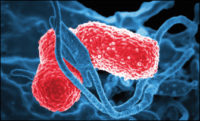Laptops and smartphones may keep you informed and connected like never before, but they also could be keeping you from getting enough sleep. A poll by the nonprofit National Sleep Foundation found a suspicious correlation between our use of high-tech gadgets and our worsening sleep habits. Here, a brief guide to the findings:
What is the connection between sleep and smartphones?
Forty-three percent of poll respondents said they rarely or never get a good night’s sleep. And nearly 95 percent reported that they frequently use a computer, smartphone, TV, or other electronic device in the hour before bedtime. “Technology has invaded the bedroom,” says study task force member Charles Czeisler, as quoted by Reuters, and that’s one reason so many Americans “routinely get less sleep than they need.”
Do laptops cause other sleep-related problems?
Yes. According to the researchers’ statement announcing their findings, “artificial-light exposure between dusk and the time we go to bed at night suppresses release of the sleep-promoting hormone melatonin.” That means the glare of your laptop “enhances alertness and shifts circadian rhythms to a later hour, making it more difficult to fall asleep.”
Wait, are we certain technology is to blame?
No, but the correlation is real. Respondents between the ages of 13 and 29 were more likely to rate themselves as “sleepy” than older generations. And it was young, tech-savvy respondents who were most likely to take technology to bed: Half of teenagers and 20-somethings admitted to using their computers nearly every night before bed, and 10 percent of teenagers said their sleep was disrupted nearly every night by their cell phones.
Is this all Facebook’s fault?
Maybe… According to another recent study, 19 percent of people under 25 reported posting to Facebook or Twitter whenever they wake up during the night, and 28 percent of iPhone users said they logged on to social-networking sites before even getting out of bed in the morning. “TV and computers have been a pre-bedtime staple for a while now,” says Dan Olds, an analyst at Gabriel Consulting Group, as quoted by Computerworld. “What do these National Sleep Foundation people expect us to do at night? Talk to each other?”
There is no question that we are trying to get by with less and less sleep and that this poses many health related issues. As we age, sleep disorders become even more pronounced.
When you add the extra stimulation from the numerous technology gadgets that capture our attention, our ability to soundly sleep through the night is greatly diminished.
As mentioned in this article, “artificial-light exposure…suppresses release of the sleep-promoting hormone melatonin.”
If you are experiencing sleep issues as a result of getting older, too much technology or both, perhaps you should try our Melatonin formulas. Let’s Talk Health’s regular Melatonin comes as a capsule with 3 mg. for people that are experiencing moderate sleep issues.
We also have Super Melatonin for individuals that are experiencing a more difficult time sleeping. Super Melatonin is a liquid that contains 50 mg liquid per dropper.
Super Melatonin was designed for the person who has had this higher dosage suggested by their doctor because of special circumstances or for the convenience of varying the dosage (1 drop = 3 mg).
In addition to being a fantastic sleep-aid, Melatonin is also the premier antioxidant of all.
 | Melatonin (60 caps)"The Fountain Of Youth" - Superior Antioxidant and Fantastic Sleep-Aid View in Store |
 | Super Melatonin (2oz)Melatonin, a Fantastic Sleep-Aid and Antioxidant, in Liquid Form View in Store |


